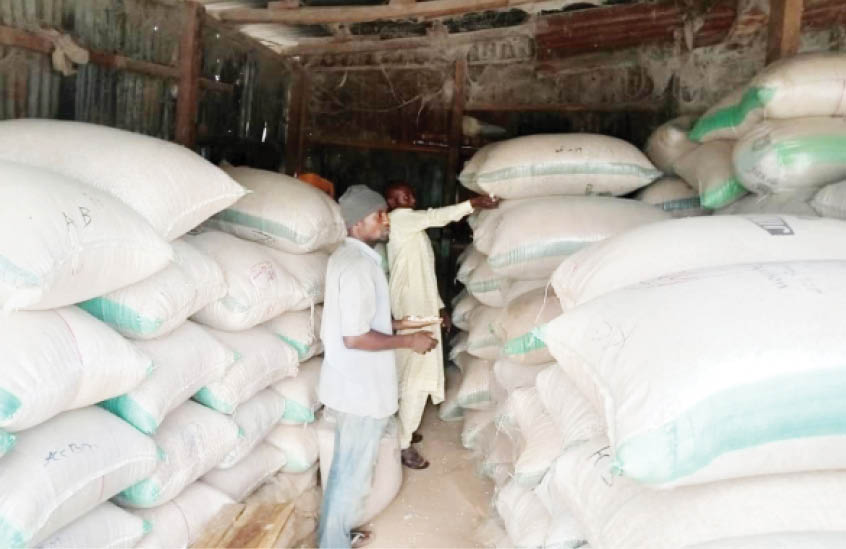Few days ago, President Bola Ahmed Tinubu unveiled immediate plans to deal with the current threat to food security in the country and hardship faced by many Nigerians.
In a nationwide address, the president said, “In the short and immediate terms, we will ensure that staple foods are available and affordable. To this end, I have ordered the release of 200,000 metric tonnes of grains from strategic reserves to households across the 36 states and the Federal Capital Territory (FCT) to moderate prices. We are also providing 225,000 metric tonnes of fertiliser, seedlings and other inputs to farmers who are committed to our food security agenda.
“Our plan to support cultivation of 500,000 hectares of farmland and all-year-round farming practice remains on course. To be specific, N200 billion out of the N500billion approved by the National Assembly will be disbursed as follows:
“Our administration will invest N50bn each to cultivate 150,000 hectares of rice and maize. N50bn each will also be earmarked to cultivate 100,000 hectares of wheat and cassava.”
Professor Rabiu Adamu, a seasoned agric expert in the Ahmadu Bello University, Zaria said the target set by the government was laudable; however, it is not likely to be achieved in the current wet season.
- Why 206 bread bakeries shut down in Yobe
- Atiku suffers setback in bid to subpoena Chicago State University over Tinubu
“These measures should have been unveiled from day one when the subsidy was removed. Agriculture being a time-bound activity cannot accommodate ad hoc measures mid-way into the rainy season. The fertilisers to be released to farmers will be late for the wet season farming. The palliatives can only be of use for dry season farmers who cultivate wheat and vegetables. Moreover, the quantity of fertilisers is not quite enough for the total hectares of land earmarked to be cultivated.
“Food would not be easily affordable as long as the cost of inputs are high, especially fertilisers and pesticides. Governments should provide favourable fiscal measures to the private sector and all stakeholders towards in-country production of critical inputs, such as fertilisers that are accessible and sustainably affordable to farmers
“There is no doubt that petrol subsidy removal will have an impact on the cost of operation of dry season farmers who use small petrol-driven pumps to irrigate their crops. This will have consequences on prices of crops through irrigation; therefore, this will necessitate search for cheaper alternative sources of power to drive the irrigation pumps,” Professor Adamu noted.
Speaking on the way forward, he said the federal government should liberalise and enhance agricultural production, financing and implementation to ensure timely access to financing by small and medium scale farmers at an affordable interest rate.
He also advised state governments, especially in states with agricultural potentials, to invest in agriculture, especially crops that are crucial to food and nutrition security, significant measures. And a policy must be put in place to uplift agricultural production through provision of adequate and effective extension system and procurement of quality agricultural inputs, such as fertilisers and seeds, which should be sold at affordable prices and made available to farmers through registered farmers’ organisations.
Dr Abraham Godson, an agric expert, who also served as a two-term senator in Poland under farmers’ party, said the intervention proposed by the president was a good one, but it is not enough.
“This is a country of 230 million people. Much of the land is abandoned because of farmer-herder conflicts. Unlike many other sectors that may see immediate effect of such intervention, agricultural production takes time. What we need is a system change that will involve integrated holistic approach to increase food production, while at the same time empowering food producers. While fuel subsidy was not necessary, subsidising agriculture is a necessity.
“Nigeria should understudy how Europe subsidises agriculture through a multi sectoral approach of grants, loans and subsidies. What we need in Nigeria is modernisation of agriculture with smallholder and medium scale farmers being the target. Nigeria will
become a net food exporter. We have so much to offer. The question is: Do we have the political will to do what it will take?” he asked. Professor Victor O. Okoruwa of the Department of Agricultural Economics, University of Ibadan, who expressed doubt that the release of 220,000 tonnes of grains would have any serious impact on the prices of grains in the market, asked the president to deal with issues of infrastructure that are key to agricultural production on sustainable basis.
He said that before embarking on anything, the president should have quickly assembled seasoned experts to conduct a ‘rapid survey’ within the two months he took over the office to quickly understand the situation of things on the ground and the real farmers to target before making certain pronouncements, adding that by the end of two months, he would have had a formation to say this is what we are going to do.
Professor Okoruwa listed three major things that the president must also look into if he is serious about bringing transformation to the sector.
“What is the bane of the agricultural sector? We are talking about a small-scale farmer having access to credit to buy inputs for production, linkages and infrastructure; and these are in twofold: we have road infrastructure and electrical infrastructure for the purposes of processing and preservations. Thirdly, if we produce and bring them out, how do we long-shelf their life so that it would be available for off-season?” he said.
In addition, the president must also look into ways of ensuring up-to-date statistics of the small scale farmers for effective planning. He noted that what is currently used are statistics that were conducted more than 12 years ago.
Another expert, Salihu Musa Achagwa, advised the president to have multi-stakeholders engagement, which is paramount to boost food production.
“The stakeholders should include the government, research institutions, farmers organisations, credit and loan institutions, insurance companies, amongst others. No organisation can do it alone, all the stakeholders should be on board to achieve these goals.
“Government should ensure that those that will be given this responsibility should be transparent enough to distribute the grains to the poorest of the poor that need them while the fertilisers and other farm inputs should be distributed directly to subsistence farmers, not businessmen and politicians that have nothing to do with agriculture.
“The cessation of rain is around the corner, but we can go with irrigation farming. We can farm throughout the year with the irrigation system of farming. With irrigation system we can produce food throughout the year without interruption,” he stated.
He noted that the country had everything it needed to produce food for itself and other countries around the world.
“We have land and human resources, technical knowledge etc. All we need is funding and political will, prudence and accountability to deliver. We will not only produce food but also create jobs for millions of Nigerian youths and consequently reduce the rate of crime and criminality we are experiencing on a daily basis.
“If Mr President wants to achieve all those policies, he needs competent technocrats and transparent people on board. Anyone that stands on his way to achieve these should be sacked, and those that are ready, willing and capable should be brought on board,” he said.
Professor Salihu Adamu Dadari, an agronomist at the Ahmadu Bello University, Zaria, asked the president to deal with the issue of insecurity because without security it would be difficult for agricultural activities to thrive.
To drive the plan, the agronomist said, “We need a professional agriculturalist, preferably a retired civil servant (not politician) who is hard working, to manage the agricultural agencies where these plans are likely to be domiciled.”
He said government at all levels must identify real farmers who are actually ready to farm and support them with inputs at an affordable and reasonable price.
Professor Dadari also called on the president to, in the interim, block all those carrying Nigerian food to places like Niger, Chad, Benin Republic, and Cameroon until a formal structure is established adding that “importing food should stop because Nigeria is supposed to be exporting food not importing.”
On his part, the president of the All Farmers Association of Nigeria (AFAN), Kabir Ibrahim, an architect, welcomed the president’s plans, saying the farmers were essentially producers but fall within the poor in Nigeria, as such, also look forward to the palliatives the government plans to distribute to Nigerians.
“We are happy that the administration plans to distribute 225,000 MT of fertilisers to the SHFs and keenly await the implementation of the outlined programme.
“We urge Mr President to closely monitor the implementation of the distribution of the fertilisers and all the palliatives as that will ensure the effective coverage of the intended segment of the society.
“We applaud the president’s address and look forward to the seamless implementation of all the planned and clearly defined sectors,” he said.

 Join Daily Trust WhatsApp Community For Quick Access To News and Happenings Around You.
Join Daily Trust WhatsApp Community For Quick Access To News and Happenings Around You.


